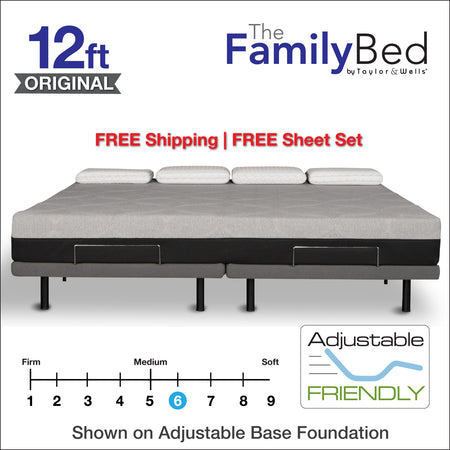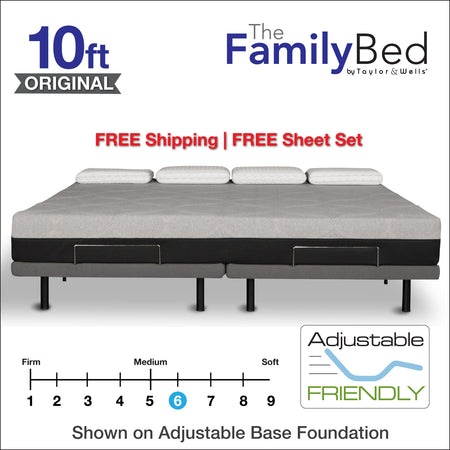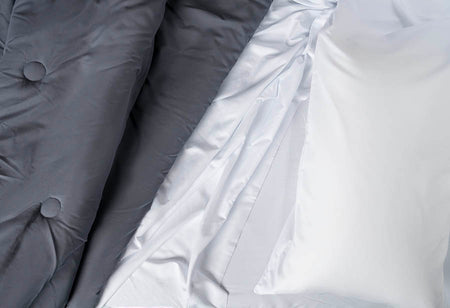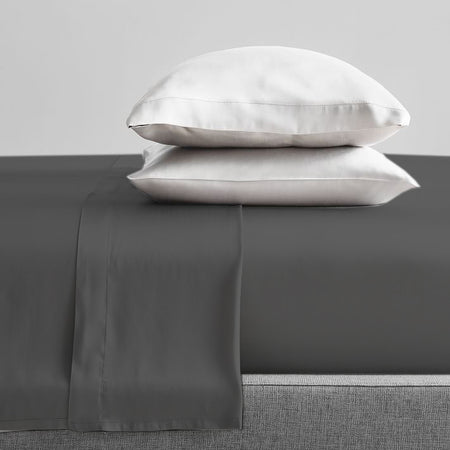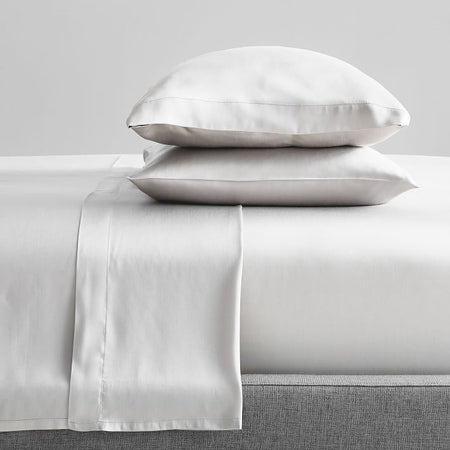Your Bedtime Beverage Guide: What to Drink (and What to Avoid) for Better Sleep
The holidays are here, and whether you’re celebrating with family, staying up for a party, or just cozying up with a good movie, our routines often get thrown off. While we talk a lot about the importance of a great mattress for sleep and a dark bedroom, what you drink and eat before bed is one of the biggest (and most overlooked) factors in your sleep quality. It's tempting to grab that last cup of coffee after dinner, or sip a glass of wine to "wind down," but those habits might be costing you hours of deep, restorative sleep. For a truly restful night, you need to support your body’s natural rhythm. Here is your simple guide to what to drink, what to eat, and what to avoid three hours before bedtime to ensure you get the rest you deserve this season. The Sleep Saboteurs: What to Avoid To give...
-
Dec 22, 2025
Sleeping with the TV On: Healthy Habit or Sleep Sabotage?
It’s a familiar scene. You’re lying in bed, exhausted but restless. So, you flick on the TV, open YouTube, or let a podcast run to quiet the racing thoughts or fill the silence. Before you know it, you’ve drifted off while a late-night talk show host or your favorite television series hums in the background. For many people, sleeping with the TV on feels like the only way to get a good night’s rest. But is it really helping? Or is it quietly sabotaging your sleep quality and long-term health? Let’s explore what the science says about TV shows, background noise, and sleep, along with healthier alternatives that can help your mind and body truly recharge. Is It a Good Idea to Sleep with the TV On? There’s been a lot of research into how the technology we use every day affects our sleep, stress levels, weight, and even our...
-
Oct 30, 2025
Why Your Dreams Have Been So Weird Lately
You go to bed expecting a peaceful night, but wake up feeling shaken, replaying bizarre imagery, unusual scenes, maybe nightmares. Why do dreams sometimes get unusually vivid, strange, or unsettling? And when does it become more than just a “weird night”? Below, we’ll unpack the science behind weird dreams, the various culprits, and concrete ways to calm things down, so you can return to more restful nights. What’s Going On in Your Brain When Dreams Get Weird? To understand why your dreams sometimes feel unusually vivid, strange, or even unsettling, it helps to look at what’s happening in the brain while you sleep. Sleep isn’t one long, steady state. Instead, your body cycles through different stages several times each night. In the early stages of non-REM (NREM) sleep, your body relaxes and brain activity slows down. Stages one and two are considered light sleep, while stage three is known as...
-
Oct 22, 2025
What Is Sleep Hypopnea? Could It Be Affecting You?
Poor sleep can affect every part of your life, from how alert you feel in the morning to how well your body protects itself from long-term health problems. Many assume their restless nights, morning headaches, or daytime fatigue are due to stress or a bad mattress. But in some cases, the cause is a sleep disorder you may not have heard much about: sleep hypopnea. What Is Sleep Hypopnea? Sleep hypopnea is a sleep-related breathing disorder. It occurs when one's breathing becomes unusually shallow during sleep. Instead of smooth, normal airflow, the upper airway becomes partially blocked, reducing the amount of air one takes in. This decrease in airflow means less oxygen reaches your blood. Over time, repeated episodes can lower your blood oxygen levels, strain your body, and prevent you from reaching restorative sleep stages. The American Academy of Sleep Medicine defines hypopnea as a partial reduction in airflow...
-
Sep 17, 2025
Jet Lag Recovery: Can Your Mattress Help You Adjust Faster?
Jet lag is essentially a circadian rhythm sleep disorder. Normally, your body clock is tuned to the 24-hour day–night cycle: daylight keeps you awake, and darkness tells your brain it’s time for sleep. But when you zoom across several time zones in a matter of hours, your internal clock can’t instantly catch up. For example, if you fly from New York to London and arrive at 11 PM local time, your body might still feel like its 6 PM back in New York, making it hard to fall asleep. Your body then goes through a “recouping” phase – sometimes linked to the growing pains of adjusting to a new schedule. The adjustment takes time. In practice, your circadian clock shifts by roughly 1–1.5 hours per day as you reset to the new zone. This means if you cross, say, 6 time zones, it could take around 4–6 days to adapt...
-
Jul 16, 2025
Napping Like a Pro: How Power Naps Enhance Productivity and Health
You know that moment, when your brain checks out, your eyelids get heavy, and everything just feels… slower? It usually hits right after lunch, and no, it’s not just you. Turns out, your body’s wired for a midday dip in energy. And the fix isn’t always another cup of coffee. Sometimes, what you really need is a quick nap. That’s why companies like Google and Ben & Jerry’s have built nap rooms into their offices. They know what NASA discovered: a short nap can boost alertness by 54% and improve performance by 34%. Why Power Naps Work The magic of power naps lie in their timing. When you rest for a short period, usually between 10 and 20 minutes, your brain stays in the lighter stages of sleep. Your body relaxes, your mind clears, and stress levels drop. This short burst of rest helps improve focus, lift your mood, and...
-
Jul 07, 2025
Are You Chronically Sleep-Deprived? Signs & Solutions to Rest Better
Sleep deprivation means regularly getting less rest than your body needs. It can be caused by stress, hectic schedules, medical problems, or simply sleeping on an old, uncomfortable bed. Poor sleep patterns over time can confuse your nervous system and reduce the amount of sleep your body gets, even if you spend hours in bed. Over time, being sleep-deprived takes a heavy toll on your body and mind. In the US, about one in three adults gets less than seven hours of sleep a night, and around 50 to 70 million people struggle with sleep disorders, according to the National Heart, Lung, and Blood Institute. Sleep deprivation can be either short-term (lasting a few days) or chronic (lasting weeks or longer). Common Signs of Sleep Deprivation If you are not getting enough rest, you might experience one or more of the following signs: Excessive fatigue during the day, feeling sleepy,...
-
Jun 23, 2025
Sleep Chronotypes: Are You a Bear, Wolf, Lion, or Dolphin?
Not everyone is wired to wake up early, fall asleep quickly, or feel energized at 9 a.m. sharp. And that’s perfectly okay. Thanks to the work of clinical psychologist and sleep expert Dr. Michael Breus, we now understand that people fall into four distinct sleep chronotypes; Bear, Wolf, Lion, and Dolphin. These categories explain your natural sleep-wake cycle, energy highs and lows, and even your ideal mattress type. So if you've ever wondered why you're ready to start the day while your partner is hitting snooze for the third time, or why your productivity peaks just before midnight, your sleep chronotype might hold the answer. Let’s dive into each chronotype, what it means for your lifestyle, and how to choose the perfect mattress for your unique rhythm. What Are Sleep Chronotypes? Sleep chronotypes are biological labels for how your circadian rhythm—your body’s internal clock—operates. This rhythm governs when you naturally...
-
May 16, 2025



